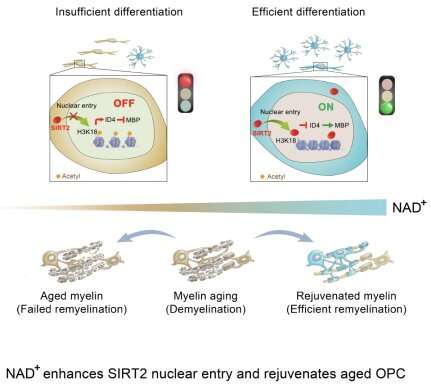β-NMN delays myelin aging and enhances myelin repair in the aged mouse brain by targeting SIRT2

Myelin is a multiple-layered structure formed by oligodendrocytes. The ensheathment of axons by myelin plays an important role in both functional integrity and long-term survival of axons and thus regulates activity of the central nervous system (CNS). However, with aging, some myelin sheaths exhibit myelin aging and even myelin degeneration, or demyelination, which is the key pathological feature of the autoimmune inflammatory diseases of CNS, such as multiple sclerosis (MS), and an early pathological hallmark of neurodegenerative diseases. Also, myelin repair, or remyelination, by oligodendrocytes, which are differentiated from oligodendrocyte progenitor cells (OPCs), occurs throughout life. Unfortunately, with aging, the efficiency of remyelination declines mainly due to the reduced capacity of OPC differentiation. Therefore, identifying new molecular targets in OPCs to rejuvenate the aged OPCs holds the key to promote remyelination.
Recently, the research group led by Prof. Zhao Jingwei at the Zhejiang University School of Medicine, in collaboration with Prof. Chen Houzao at Chinese Academy of Medical Sciences & Peking Union Medical College, Prof. Shu Yousheng at Beijing Normal University, and Ju Zhenyu at Jinan University, published an article in the journal Nature Communications.
The study showed that SIRT2 is expressed in postnatal OPCs but the nuclear localization of SIRT2 in OPCs during remyelination declines during aging. Using SIRT2 knock mice, they showed that SIRT2 is critical for remyelination.
Furthermore, the study revealed that NAD+ was one of the top metabolites that significantly decreased in the aged OPCs obtained from telomerase deficiency early aging mice. Elevating NAD+ by β-NMN, the immediate precursor of NAD+, enhances SIRT2 nuclear entry in OPCs and promotes OPCs differentiation. They further showed that in vivo NAD+supplementation not only prevents but also treats the demyelination and enhances remyelination efficiency in the CNS of the aged mice to the level of the young mice both structurally and functionally, highlighting the therapeutic effect of β-NMN on demyelination diseases in the old animals.
The study also clearly dissected the molecular mechanisms underlying the effects of NAD+: aged OPCs are depleted in SIRT2 nuclear localization and have less NAD+. Supplementation of β-NMN elevates the NAD+ level, restores nuclear entry of SIRT2 in the aged OPCs and deacetylates H3K18, thus suppressing the transcription of ID4 and further promoting OPCs differentiation, and eventually delays myelin aging in the normal CNS and enhances myelin repair in the demyelinated aged CNS.
"Our work demonstrates that β-NMN not only delays myelin aging in normal, but also enhances myelin repair in diseased conditions," Dr. MA Xiaoru, one of the first authors, says. "This study found β-NMN as a new small molecule for myelin aging, and more importantly, identified SIRT2 as a new target for oligodendrocyte lineage cells, paving the way for future clinical translation study on demyelination and neurodegenerative diseases," Prof. Zhao Jingwei further states.
More information: Xiao-Ru Ma et al, Restoring nuclear entry of Sirtuin 2 in oligodendrocyte progenitor cells promotes remyelination during ageing, Nature Communications (2022). DOI: 10.1038/s41467-022-28844-1


















